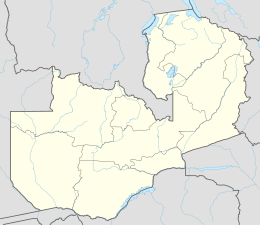Operation Saffraan: Difference between revisions
m Robot - Moving category 1979 in Namibia to Category:1979 in South-West Africa per CFD at Wikipedia:Categories for discussion/Log/2013 July 10. |
|||
| (19 intermediate revisions by 15 users not shown) | |||
| Line 1: | Line 1: | ||
{{Use dmy dates|date=April 2022}} |
|||
{{operational plan |
{{operational plan |
||
| name = Operation |
| name = Operation Saffraan |
||
| partof = [[South African Border War]] |
| partof = the [[South African Border War]] |
||
| image = |
| image = |
||
| caption = |
| caption = |
||
| Line 36: | Line 37: | ||
{{Campaignbox South African Border War}} |
{{Campaignbox South African Border War}} |
||
'''Operation |
'''Operation Saffraan''' ({{langx|en|Operation Safron}}) was a series of [[South African Defence Force]] raids from the [[Caprivi Strip]] area during the [[South African Border War]]. On 23 August 1978 [[People's Liberation Army of Namibia|PLAN]] and the Zambian army shelled the small South African garrison town Katimo Mulilo in eastern Caprivi (Namibia). In March 1979, South African forces entered south-western [[Zambia]] attacking [[People's Liberation Army of Namibia|PLAN]] bases in retaliation for the shelling of Katimo Mulilo.<ref name=Steenkamp>{{cite book|last=Steenkamp|first=Willem|title=South Africa's border war, 1966-1989|year=1989|publisher=Ashanti Pub.|location=Gibraltar|isbn=0620139676}}</ref>{{rp|86}} These bases were around Sinjembele and the Njinje forest,<ref name="Hamann">{{cite book|last=Hamann|first=Hilton|title=Days Of The Generals: The Untold Story of South Africas Apartheid-era Military Generals|year=2007|publisher=Struik Publishers|isbn=978-1868723409}}</ref>{{rp|Chpt4}} were found to have been vacated but the facilities were destroyed disrupting future border infiltrations.<ref name=Steenkamp/>{{rp|86}} The raid into Zambia resulted in [[SWAPO]] being asked to leave the country.<ref name=Hamann/>{{rp|Chpt4}} Conducted on 7 March 1979 concurrently with [[Operation Rekstok]]; it followed [[Operation Reindeer]] and preceded [[Operation Sceptic]]. |
||
eastern Caprivi (Namibia). In March 1979, South African forces entered south-western [[Zambia]] attacking [[People's Liberation Army of Namibia|PLAN]] bases in retaliation for the shelling of Katimo Mulilo.<ref name="Steenkamp-p86">Steenkamp, Willem (1989). ''South Africa's Border War 1966 - 1989.'' p. 86.</ref> These bases were around Sinjembele and the Njinje forest,<ref name="Hamann-c4">Hamann, Hilton (2001). ''Days of the Generals.'' eBook. Chapter 4.</ref> were found to have been vacated but the facilities were destroyed disrupting future border infiltrations.<ref name="Steenkamp-p86" /> The raid into Zambia resulted in [[SWAPO]] being asked to leave the country.<ref name="Hamann-c4" /> Conducted on 7 March 1979 concurrently with [[Operation Rekstok]]; it followed [[Operation Reindeer]] and preceded [[Operation Sceptic]]. |
|||
==See also== |
|||
The name means "saffron" in [[Afrikaans]]. |
|||
| ⚫ | |||
==Further reading== |
|||
* Steenkamp, Willem. ''South Africa's Border War 1966 - 1989''. Ashanti Publishing, 1989. |
|||
* Hamann, Hilton. ''Days of the Generals''. Zebra Press, 2001. |
|||
| ⚫ | |||
==References== |
==References== |
||
<references /> |
<references /> |
||
== |
==Further reading== |
||
* {{cite book|last=Steenkamp|first=Willem|title=South Africa's border war, 1966-1989|year=1989|publisher=Ashanti Pub.|location=Gibraltar|isbn=0620139676}} |
|||
| ⚫ | |||
* {{cite book|last=Hamann|first=Hilton|title=Days of the generals|year=2001|publisher=Zebra|location=Cape Town|isbn=978-1868723409|edition=1st}} |
|||
| ⚫ | |||
{{coord missing}} |
{{coord missing|Zambia}} |
||
{{S-start}} |
{{S-start}} |
||
| Line 62: | Line 59: | ||
| after = [[Operation Sceptic]] |
| after = [[Operation Sceptic]] |
||
}} |
}} |
||
{{s-end}} |
|||
{{South African Border War}} |
|||
{{DEFAULTSORT: |
{{DEFAULTSORT:Saffraan, Operation}} |
||
[[Category:Conflicts in 1979]] |
[[Category:Conflicts in 1979]] |
||
[[Category:1979 in Angola]] |
[[Category:1979 in Angola]] |
||
[[Category:1979 in South |
[[Category:1979 in South West Africa]] |
||
[[Category:1979 in South Africa]] |
[[Category:1979 in South Africa]] |
||
[[Category:Cross-border operations of South Africa]] |
|||
[[Category:Battles and operations of the South African Border War]] |
[[Category:Battles and operations of the South African Border War]] |
||
Latest revision as of 07:18, 26 October 2024
| Operation Saffraan | |
|---|---|
| Part of the South African Border War | |
| Location | Zambia |
| Target | Various PLAN bases |
| Date | March 1979 duration 5 weeks |
Operation Saffraan (English: Operation Safron) was a series of South African Defence Force raids from the Caprivi Strip area during the South African Border War. On 23 August 1978 PLAN and the Zambian army shelled the small South African garrison town Katimo Mulilo in eastern Caprivi (Namibia). In March 1979, South African forces entered south-western Zambia attacking PLAN bases in retaliation for the shelling of Katimo Mulilo.[1]: 86 These bases were around Sinjembele and the Njinje forest,[2]: Chpt4 were found to have been vacated but the facilities were destroyed disrupting future border infiltrations.[1]: 86 The raid into Zambia resulted in SWAPO being asked to leave the country.[2]: Chpt4 Conducted on 7 March 1979 concurrently with Operation Rekstok; it followed Operation Reindeer and preceded Operation Sceptic.
See also
[edit]References
[edit]- ^ a b Steenkamp, Willem (1989). South Africa's border war, 1966-1989. Gibraltar: Ashanti Pub. ISBN 0620139676.
- ^ a b Hamann, Hilton (2007). Days Of The Generals: The Untold Story of South Africas Apartheid-era Military Generals. Struik Publishers. ISBN 978-1868723409.
Further reading
[edit]- Steenkamp, Willem (1989). South Africa's border war, 1966-1989. Gibraltar: Ashanti Pub. ISBN 0620139676.
- Hamann, Hilton (2001). Days of the generals (1st ed.). Cape Town: Zebra. ISBN 978-1868723409.
- Nothling, CD (Col.). Kort Kroniek van Militêre Operasies en Optredes in Suidwes-Afrika en Angola (1914-1988). Scientia Militaria: South African Journal of Military Studies, Vol 19, Nr 2, 1989.

